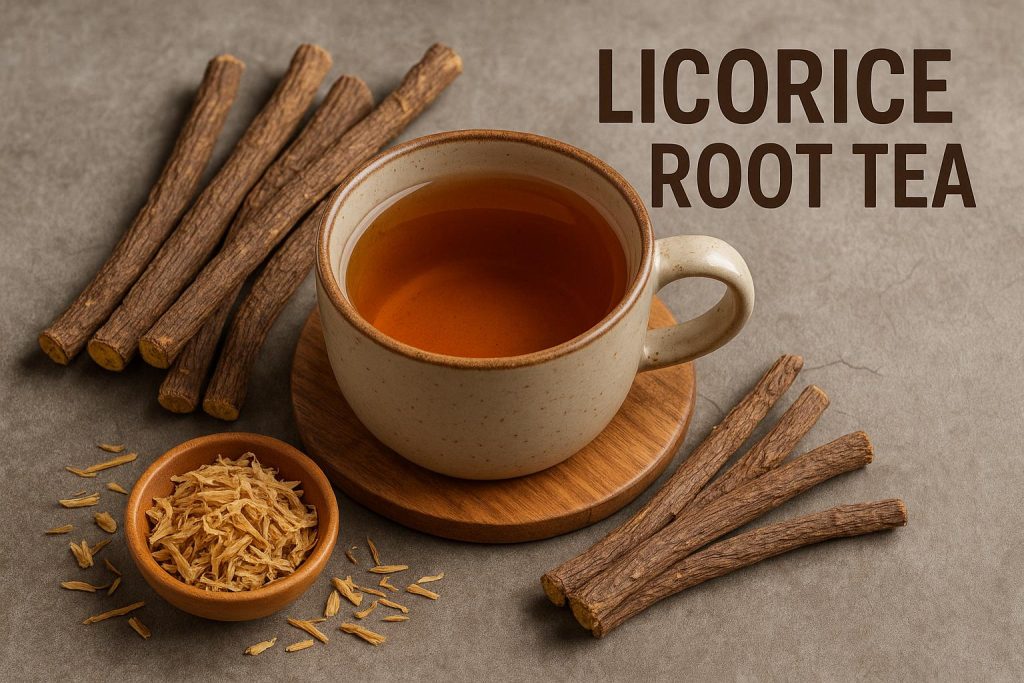
Overview of Licorice Root Tea
Licorice root tea is a particular type of herbal infusion derived from the root of the licorice plant, scientifically named Glycyrrhiza glabra. Renowned for its distinctive sweet flavor, this tea has been consumed by numerous cultures over several centuries. Its rich history in both Eastern and Western medicinal traditions underscores its potential therapeutic contributions.
Potential Health Benefits
Licorice root tea is frequently lauded for its array of potential health benefits. The presence of glycyrrhizin, a primary compound found in the licorice root, is believed to be a significant contributor to its medicinal properties. Let us explore some of the notable benefits associated with consuming licorice root tea:
Anti-inflammatory Properties
Licorice root is esteemed for its anti-inflammatory components. These elements might prove advantageous in mitigating inflammation throughout the body. This property is of particular interest to those experiencing inflammatory conditions, such as arthritis. By contributing to reduced inflammation, licorice root tea might offer a natural alternative for supporting joint health.
Digestive Support
The soothing quality of licorice root tea makes it beneficial for digestive health. Many individuals turn to this tea for alleviating symptoms relating to indigestion, stomach ulcers, and heartburn. Its gentle nature can offer a calming effect on the digestive tract, potentially providing relief from discomfort associated with these conditions.
Symptom Relief and Comfort
Licorice root tea may gently soothe the digestive system, which can be particularly valuable after a heavy meal. Its compound glycyrrhizin is often praised for its antacid-like properties, providing a natural means to balance acid levels for those prone to stomach issues.
Immune System Boost
Evidence suggests that licorice root might play a role in boosting the immune system. By enhancing immune function, licorice root tea could potentially assist in preventing common colds and other infections, contributing to overall wellness.
Adaptive Properties of Licorice Root
Apart from direct immune benefits, licorice root is considered to possess adaptogenic properties, helping the body adapt to stress and maintain equilibrium. This adaptogenic aspect might indirectly support immune health by balancing the body’s responses to stressors.
Considerations and Precautions
While licorice root tea offers several potential benefits, certain considerations and precautions are essential for safe consumption.
Glycyrrhizin Levels
The primary compound, glycyrrhizin, is both a benefit and a concern. Consuming high levels of glycyrrhizin through excessive intake of licorice root tea can lead to side effects such as high blood pressure and low potassium levels. These conditions are critical to monitor, and moderation in consumption is strongly advised.
Balance and Monitoring
When enjoying the benefits of licorice root tea, it is crucial to balance its intake with awareness of the body’s response. Regular monitoring of blood pressure and electrolyte levels can help ensure that health benefits are maximized without adverse effects.
Pregnancy and Health Conditions
Individuals who are pregnant or those managing particular health conditions like kidney disease or hypertension should approach licorice root tea with caution. Consulting a healthcare professional is a prudent step to ensure that its consumption aligns with their health needs.
Consultation and Cautious Consumption
Pregnant individuals, in particular, are often advised to limit the consumption of licorice root due to potential hormonal effects that may affect pregnancy. Managing underlying health conditions also requires careful assessment by healthcare providers prior to incorporating licorice root tea into the diet.
Usage and Preparation
Licorice root tea is made by steeping dried licorice root or using pre-packaged tea bags found in the market. Although a small quantity of licorice root is typically sufficient due to its potent flavor, the method of preparation can impact the strength and effectiveness of the brew.
Preparation Tips
Using approximately one teaspoon of dried licorice root per cup of hot water is a common method. Allowing the tea to steep for about 5 to 10 minutes usually ensures a flavorful and balanced infusion. For those who prefer a milder taste, shorter steeping times or smaller amounts of the root can be employed.
Quality Sourcing
Purchasing licorice root tea from reputable suppliers is critical to ensuring quality and purity. Since sourcing can affect the concentration of active compounds, selecting high-quality products from established vendors is recommended. For further guidance on finding reputable suppliers, consider visiting curated vendor lists online.
Conclusion
Licorice root tea offers a plethora of potential health benefits, positioning it as a favored choice among herbal teas. From its anti-inflammatory effects to digestive support and immune-boosting properties, its appeal is multifaceted. However, moderation remains a key element in reaping these benefits without encountering adverse effects related to glycyrrhizin levels. It is prudent to acknowledge these health-related precautions and seek guidance from healthcare professionals, particularly for pregnant individuals and those with specific health conditions. As with any herbal supplement, personal research and professional consultation can ensure that this soothing herbal tea becomes a beneficial aspect of overall health management while respecting individual needs and nuances.

